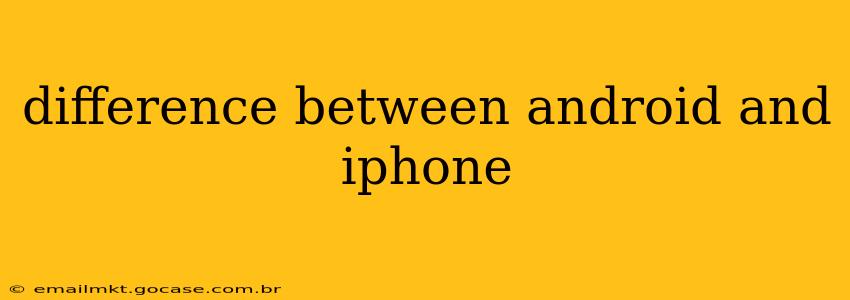The smartphone market is largely dominated by two titans: Android and iPhone. While both offer the ability to browse the internet, take photos, and play games, significant differences exist beneath the surface, impacting user experience, cost, and overall functionality. Choosing between them often boils down to personal preference, but understanding these core distinctions is crucial for making an informed decision.
What is the biggest difference between Android and iPhone?
The biggest difference lies in the operating system (OS). iPhones run on iOS, developed and controlled entirely by Apple. Android, on the other hand, is an open-source OS developed by Google and licensed to various manufacturers like Samsung, Google, OnePlus, and Xiaomi. This fundamental difference branches out into several key areas:
What are the main differences between iPhone and Android phones?
Let's delve into some of the major distinctions:
1. Operating System & User Interface
-
iOS (iPhone): Known for its simplicity and intuitive user interface. iOS prioritizes ease of use, offering a streamlined and consistent experience across all Apple devices. Customization options are limited compared to Android.
-
Android: Offers a much higher degree of customization. Users can personalize almost every aspect of their phone, from widgets and launchers to icon packs and notification styles. This flexibility comes with a slightly steeper learning curve for some users. The interface varies somewhat depending on the manufacturer (Samsung's One UI, for instance, differs from Google's Pixel UI).
2. App Ecosystem
-
iOS App Store: Known for its stringent app review process, resulting in a generally higher quality and safer app ecosystem. However, it might have a slightly smaller selection of apps compared to Google Play Store.
-
Google Play Store: Boasts a significantly larger library of apps. The less strict review process means that some apps might be less polished or even contain malware, though Google actively works to mitigate these risks.
3. Hardware & Ecosystem Integration
-
iPhone: Apple designs both the hardware and software, resulting in seamless integration. This tight control allows for optimized performance and a cohesive user experience across all Apple devices. Features like AirDrop and Handoff work flawlessly.
-
Android: Hardware is manufactured by various companies, leading to a wider range of choices in terms of design, features, and price points. However, this can also result in inconsistencies in performance and software updates, depending on the manufacturer and model. Ecosystem integration varies depending on the manufacturer.
4. Price
-
iPhone: Generally positioned at the higher end of the price spectrum. The premium pricing reflects the brand recognition, build quality, and tight integration between hardware and software.
-
Android: Offers a much broader price range, catering to various budgets. You can find high-end flagship phones comparable to iPhones, as well as budget-friendly options with decent specifications.
5. Security and Privacy
Both iOS and Android have robust security features. Apple's tight control over its ecosystem offers a streamlined approach to security updates, ensuring that all devices receive the latest patches simultaneously. Android's open nature presents more opportunities for vulnerabilities, but Google actively works to address these issues through regular security updates. However, the frequency and timeliness of updates can vary depending on the manufacturer and model.
6. Customizability
-
How customizable is an iPhone? iPhone customization is limited primarily to wallpapers, widgets (introduced more recently), and app arrangement. The overall aesthetic and functionality remain largely consistent.
-
How customizable is an Android? Android offers a vast range of customization options, allowing users to deeply personalize their phone’s appearance and functionality. This includes launchers, widgets, icon packs, and even the ability to change the system's core behavior.
7. Which is better for gaming?
Both platforms offer extensive gaming libraries. High-end Android devices often boast more powerful processors, potentially providing a slight edge in graphics-intensive games. However, iOS often benefits from optimized game development, leading to smooth performance even on less powerful hardware. The best gaming experience depends on the specific games and devices.
8. Which is better for business?
The choice depends heavily on the specific business needs and existing infrastructure. Apple's ecosystem integration and strong security features can be advantageous for businesses prioritizing seamless collaboration and data security. Android's flexibility and wider range of devices can be appealing for businesses needing diverse solutions at different price points.
Ultimately, the "better" choice between Android and iPhone depends entirely on individual priorities and preferences. Consider your budget, desired level of customization, and preferred ecosystem when making your decision. Both platforms offer excellent smartphones catering to a wide range of needs and tastes.
